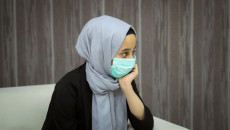A national team from Baghdad is leading a campaign to collect information and blood samples from the relatives of the victims of Tal Afar district of Ninewa province with the aim of revealing the fate of the missing at the hands of the Islamic State of Iraq and the Levant (ISIL).
The team began its work on June 28, 2022 at the mayor’ office in Tal Afar and will continue until July 6th.
"The team includes representatives of the forensic office, the office of mass graves affairs of the Martyrs Institute, with the support of the International Commission on Missing Persons (ICMP)," an official source told KirkukNow.
The source asked the relatives of the missing to visit the team to share the necessary information and donate blood samples to reveal the fate of the missing.
Blood samples are used for DNA testing to identify unknown bodies by taking a sample from the body and comparing it with blood samples from relatives of the missing.
On June 16, 2014, ISIS fighters attacked Tala'afar and local tribes alongside security forces were able to stand in the face of the atrocious attack for 10 days yet lost contact with the army. Simultaneously, ISIS had advanced into several other provinces, including Kirkuk, Salahaddin, Diyala and Anbar.
According to local activists and civil society organizations in Tal Afar, out of 1,300 people kidnapped during the rule of ISIS, including hundreds of women and children, only 48 people have been released, including 23 women and 25 men.
Among the 23 surviving girls and women, "they confessed to being raped and forced to abortion by the organization's fighters."
In February 2021, Istebrak Yezaoğlu, head of the Turkmen Front's mass organizations, revealed that 1300 Turkmens were abducted, 470 were women, 700 men and 130 children, taken by ISIS fighters into unknown destiny.

The work of the national team is part of the preparations of the local administration of Tal Afar and in coordination with the international community to excavate the grave of Alo Antar in the north of the district, which is one of 95 mass graves, home to victims slaughtered and buried at the hands of Daesh, according to the United Nations and the office of the United Nations’ High Commissioner for Human Rights and United Nations assistance Mission to Iraq UNAMI, the source added.
In a gathering to commemorate the eighth anniversary of ISIS take over of Tal Afar held on June 16, 2022, the residents of Tal Afar, demanded relevant authorities to uncover the fate of hundreds of missing Turkmens, including children and women.
"The local authorities are making every effort to coordinate with the team assigned to identify the bodies and exhume the remnants from the mass graves, which an international organization has previously worked and cleaned," Qasim Mohammed Sharif, the mayor of Tal Afar, told Kirkuk Now.
The Martyrs' Agency said in a statement that in coordination with the forensic office and their international partners (UNITAD) and (ICMP), they have planned to excavate the graves, and the first phase of excavation is collecting information and taking blood samples.
Earlier, in February 2020, the High Commission for Human Rights in Iraq, investigated the mass graves in Tal Afar district and revealed that only one grave embraces the bodies of 1,000 Turkmen and Ezidi (Yazidi) citizens.
The people of Tala'afar district, which has a population of more than 524,000, according to the Ministry of Planning for 2019, were severely hurt by crimes committed by ISIS fighters against different religious and ethnic communities.
The center of Tala'afar, located 69 km northwest of Mosul in Ninewa province, has an estimated population of about 220,000, all of whom are Turkmens, while Arabs and Kurds live in districts and villages.
The district was controlled by the Iraqi government in August 2017. About 60% of its people have returned to their homes, mostly Shiite Turkmens, while the rest are still displaced, residing in southern and central Iraqi provinces, especially in Najaf, Karbala and Babylon, in addition to the Kurdistan Region of Iraq KRI and Kirkuk. Some have also migrated abroad, including Turkey.
Turkmens are considered the third largest ethnic group in Iraq after Arabs and Kurds, residing almost exclusively in the northern towns and villages stretching from Talafar through Mosul, Erbil, Altun Kupri, Kirkuk, Tuz Khurmatu, Kifri and Khanaqin. They are half Sunnis and half Shiite.






